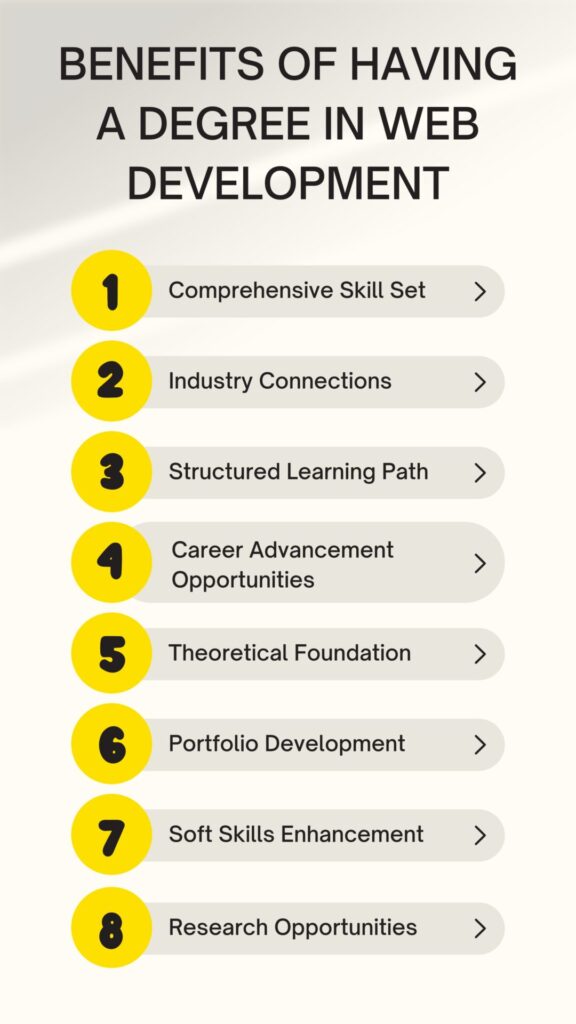What Degree Do You Need For A Web Developer? Find out about the routes you can take to become a web developer. Read the information about the required degree, other possibilities, and skills necessary to achieve success in this progressive IT field.
Introduction
Another essential question, particularly when considering the web developer profession, is do you need a specific degree to get a job. It is equally important to point out that it is not mandatory to have a degree in computer science, WEB development, or any other related field. To become a full-stack web developer, one does not necessarily have to go to college or acquire a degree, as many have learned through self-study, boot camps, or, in some cases, by simply practicing on their own. In this article, I will list down the different educational paths available and assist you in deciding which path will be right for your transition to web development.
What degree do you need for a web developer?
It is not obligatory to get to work as a web developer with a certain degree; however, education in the sphere can serve as a more solid starting point and create even wider opportunities during work experience. See below for a more detailed description of the traditional educational models as well as the other routes that one can undertake in order to have a good career in this field.
Common Degrees for Web Development
1. Computer Science:
- Computer science as a major is among the most flexible and all-encompassing directions offered to those who want to become web developers. It includes programming fundamentals, algorithms, data structures, and computer systems, all of which are crucial to grasp the big frameworks of website development.
- The flexibility of graduates in problem-solving and good knowledge of the different programming languages in this area enables them to fit in both front-end, back-end, or full-stack web development.
2. Software Engineering:
- Software development is essentially an engineering discipline, at the core of which lies this degree. It interlinks with computer science but with a special focus on programming and includes topics such as software design, development, evaluation and sustainment.
- Software engineers who graduate do so with the training to be able to manage large and complex web applications and make them sustainable in the long run.
3. Information Technology (IT):
- The IT degree offers a more general perspective on how technology can be used to address an organisation’s issues. It includes areas of networks, databases, and security, which are significant in web development.
- This degree is more helpful to those students who wish to develop their career in the technical aspect of the website, including the server side of the website.
4. Web Development:
- It is noteworthy that some universities allow earning a degree in Web development, which is entirely dedicated to the work on the website. These programs may consist of classes such as HTML, CSS, Javascript, User Experience/Interface design, and a wide range of others in back-end technologies.
- This degree is a direct route to a web development job and you will have practical experience in employing the tools and technologies employed most frequently in web development.
Alternative Paths to Web Development

1. Coding Bootcamps:
- Coding boot camps are short-term training programs aimed at providing you with the down-to-earth skills you require for web development in several months. The former is based on the tips of modern technologies and frameworks and can help to enter the subject rapidly.
- Most also have career services to assist the graduates in the creation of portfolios, résumés, and employment searches.
2. Self-Learning Through Online Resources:
- Today, many sources are available on the Internet for those people who like to study by themselves. These and other free platforms, such as freeCodeCamp, Codecademy, and Coursera, provide the most extensive web development courses, both front-end and back-end.
- Self-learners have to be motivated and take the initiative, but it is possible to study at their own pace and more effectively than at school, and it can be done along with work.
3. Associate Degrees in Web Development:
- An associate degree in web development is bent for two years; it begins with web designing and development fundamentals. It is far cheaper, takes a shorter time than a bachelor’s degree, and can help one get entry-level jobs.
- It is a middle ground between the attainment of a theoretical type of education and the realistic world that one needs to engage in the practice in the labour market.
Essential Skills for Web Developers
Regardless of your educational path, certain skills are fundamental to becoming a successful web developer: Regardless of your educational path, certain skills are fundamental to becoming a successful web developer:
1. HTML, CSS, and JavaScript:
These are the basics of development in the World Wide Web. HTML defines the layout of the content and its division; CSS controls the looks and appearance of the content, and JavaScript adds the ability for content to respond to an interaction.
2. Backend Languages (e. g., Python, PHP, Ruby): Backend Languages (e.g., Python, PHP, Ruby):
It is very important to have experience with a backend language if you are to work on the server side. It lets you develop two or multi-dimensional websites that require databases, user log in and so on.
3. Database Management:
This can be the MySQL or PostgreSQL knowledge or any other familiar database or even MongoDB for data storage.
4. Version Control (e. g. , Git):Version Control (e. g. , Git):
Important tools such as version control systems like Git help in tracking changes in the code and other developers.
5. Responsive Design:
As the usage of smart portable devices rises, it becomes important that the websites are adjustable according to the screen size.
6. Web Security Basics:
To secure users’ data, one has to learn some fundamental rules of web security: anti-sql-injection, anti-xss, and working with https.
Key Points to Consider
- Degree Preference: Though employers generally like to see applicants having a bachelor’s degree, it is not always mandatory. More important is the range of competencies which you have learned, your experience and the certification that samples of your work can support.
- Practical Experience: Thereby they prefer candidates that possess practical knowledge and experience as compared to formal education. For example, the accumulation of work experience, creation of a powerful portfolio, work experience through internships, and participation in open-source projects are no less significant than the degree.
- Continuous Learning: Web development, as it has been mentioned, is a developing field, and new technologies and approaches are being introduced more often. In the long term, people who striving for success must constantly refine their knowledge regardless of the previous education they had.
Career Advancement
- Importance of a Degree for Senior Roles: It is possible to gain entry into the profession without formal education in the field, but a degree may become beneficial as you progress to another level of, say, senior or managerial roles where one may require a bird’s eye view of software engineering concepts or project management among other aspects.
- Certifications: Besides, such certifications as those offered by Microsoft, Google AWS, etc., can enhance professional credentials and highlight the necessary specialization in the sphere of web development.
Benefits of Having a Degree in Web Development
There are several benefits inherent with a web development degree in the current employment world that is driven by the internet. Here are some key benefits: Here are some key benefits:

1. Comprehensive Skill Set
- Master a good number of programming languages and other technologies.
- Master front-end and back-end solutions as well
- Analyse and solve problems using skills developed.
2. Industry Connections
- Access to internship opportunities
- Interacting with professors, as well as guest speakers, who are from the said industry
- Opportunity for joint ventures with technology organisations
3. Structured Learning Path
- Detailed programs of study that will teach all areas of web development.
- Meet all stakeholders in the industry and be exposed to the modern practices that others practice.
- Feedback, in particular, should be provided all the time so that the progress is monitored constantly.
4. Career Advancement Opportunities
- Tends to have a higher probability of getting into senior developer or management positions.
- Improved positioning of specific, more narrow areas of interest like UX/UI design or Cyber Security
- Higher earning capacity in the long run
5. Theoretical Foundation
- Knowledge concerning computer science concepts
- Understanding of the methodology of software development
- Gets to learn about the various developments made in the world of the web.
6. Portfolio Development
- Introduced an environment where guided projects are carried out for the formation of a good portfolio.
- Availability of materials for developing sophisticated, modishly professional Web sites
- The chance to work on actual projects through links with universities
7. Soft Skills Enhancement
- Assist the development of communication skills through members of groups as well as presentations.
- This will, in fact, develop time management and project planning abilities.
- Study the dynamics of when to work in teams
8. Research Opportunities
- Participate in web development research proceedings of the highest technical standard.
- Opportunity to participate in producing and publishing articles in the field
- The awareness that the development of the Authoring Tool enhanced specific emerging technologies and their possible usages
9. Credibility and Recognition
- Academic award that is recognized by employers globally
- The candidate proves loyalty and passion to the area of study.
- This can be particularly valuable when looking for work across the world.
10. Broad Perspective
- Certainly, awareness of how web development as a process is situated in the broader business environments.
- Understanding of other connected areas, such as digital marketing and data analytics
- This means that it’s easier to manage the logistics of different pertaining parts by being able to combine both the technical and the non-technical elements of projects.
Of course, an academic degree is not the only way to become a web developer, but it will give you a clear and profound plan and start to build your career in this perspective, fast-developing field.
FAQ’s
Yes, coding boot camps are a recent phenomenon that has emerged to fill the gap of people seeking fast training with a focus on practical application. They are intensively centre on contemporary technologies, and many of them incorporate practical projects in creating portfolios.
Other requirements are a basic understanding of HTML, CSS, JavaScript and other back-end languages such as Python and PHP and basic knowledge of database management and the use of version control systems, which include Git.
Yes, you can be employed at entry-level even if you have an associate degree in web development or a related field. To stand out, you need to support your degree with a good portfolio and practical experience.
Absolutely. Business, as well as computers, are evolving as a field of work; therefore, it is important to update oneself with the new technologies, techniques, and frameworks highlighted for any accreditations to persist in the long run.
This may not be very crucial unless obtaining a degree is inevitable, especially when working as a senior or a manager. Many employers may prefer the wider perception and specific academic foundation in computer science or software engineering for top-tier jobs, anyway. Certifications can also improve your profile for such positions.
Conclusion
Though it is not compulsory to acquire a degree to become a web developer, attaining a degree in computer science, web development or any related field will add a plus to your credentials. But the truth is that many web developers make use of other routes such as boot camps, self-training, or simply practicing. The essence of a web developer career is your efficiency, your work sample, and the capacity to get acquainted with the changes made to the profession. Wherever you are in your chosen field, with or without a formal education, your commitment to learning is what will make or mar you in this profession.




